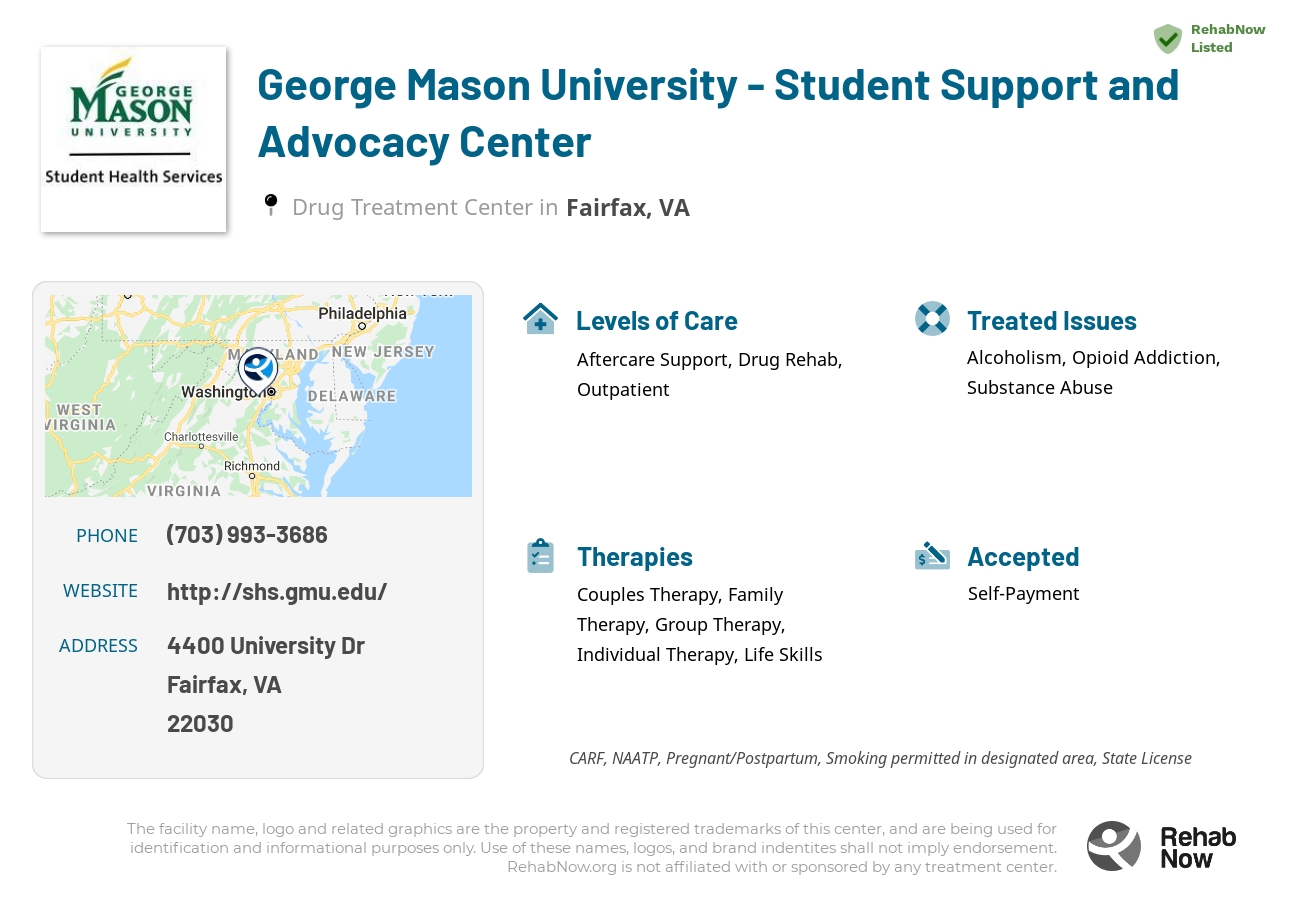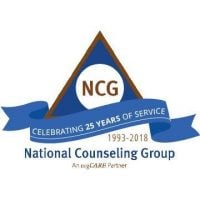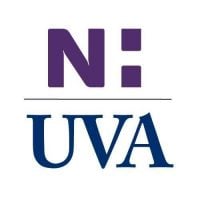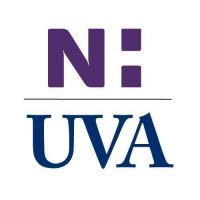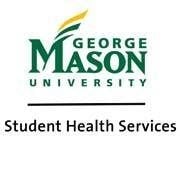
George Mason University - Student Support and Advocacy Center
Drug Rehab Center in Fairfax, Virginia
- Substance Abuse
- Opioid Addiction
- Drug Addiction
- Alcoholism
Mason's Student Support and Advocacy Center (SSAC) provides comprehensive alcohol and substance abuse treatment services in Fairfax, Virginia, emphasizing a holistic approach and individualized care.
About This Fairfax, VA Facility
Located in Fairfax, Virginia, George Mason University - Student Support and Advocacy Center is a drug treatment facility that specializes in helping individuals struggling with alcoholism, opioid addiction, substance abuse, and drug addiction. This center offers comprehensive services for those looking to overcome their addiction and achieve sobriety. With a focus on providing support and advocacy, George Mason University - Student Support and Advocacy Center strives to create a safe and welcoming environment for students in need of assistance.
At George Mason University - Student Support and Advocacy Center, individuals can access a range of services and treatment methods to address their addiction and substance abuse issues. They offer aftercare support, which provides continued support and guidance to individuals once they have completed their treatment program. Additionally, the center offers drug rehab services, providing intensive treatment and counseling to assist individuals in overcoming their addiction. They also provide outpatient levels of care, offering flexibility and convenience for individuals who may not require residential treatment but still need support in their recovery journey. Through a combination of therapies, support groups, and individualized treatment plans, George Mason University - Student Support and Advocacy Center strives to empower individuals to achieve lasting sobriety.
Genders
Ages
Modality
Additional
Conditions and Issues Treated
Recovering from any type of substance abuse is a long process, but it is one of the most worthwhile and life changing events any addicted person will ever go through. This is a combination of detoxing the body, rehabilitation, and recovery. There is also therapy, aftercare, and support during the entire process.
While substance abuse can take over a person’s life, it is something that can also be overcame by professionals at George Mason University - Student Support and Advocacy Center in Fairfax, VA
Opioid + Opiate Addiction Treatment at George Mason University - Student Support and Advocacy Center
With so many people struggling with opioid addiction, opioid addiction treatment is more critical than ever before. Patients often take opioids when they face a painful injury. When someone begins taking opioids such as Vicodin or oxycodone differently than how the medications were prescribed, this points to opioid addiction.
Stopping these types of medications abruptly is not safe. That is where opioid addiction treatment at George Mason University - Student Support and Advocacy Center in Fairfax, VA comes in. Most opioid addiction treatment facilities start with detox and move to rehabilitation services while providing medical support during the process.
Getting over an opioid addiction takes time and determination, but with the right support and resources, those struggling with opioid addiction can recover and move forward with their lives.
Levels of Care Offered
This center offers a variety of custom treatment tailored to individual recovery. Currently available are Aftercare Support, Drug Rehab, Outpatient, with additional therapies available as listed below.
Outpatient treatment can be considered the lowest intensity level of addiction treatment in Fairfax, VA. It is ideal for early phase addiction or lower intensity addictions. George Mason University - Student Support and Advocacy Center peer group support, 12-step programs, and individual counseling may still be involved.
Aftercare support plays an important role when sustaining a patient’s full recovery at George Mason University - Student Support and Advocacy Center. Patients also receive assistance in making living arrangements in halfway houses. Career counseling is available for those who want a fresh start. There are also local community programs in Fairfax, VA such as Alcoholics Anonymous.
George Mason University - Student Support and Advocacy Center‘s Therapies & Programs
Individual professional counseling or individual therapy refers to the one-on-one interaction between a patient and his or her counselor. Individual therapy allows for more privacy, one that group interactions can’t provide. Therefore, it becomes easier for a person to unload and become more open to his or her counselor.
Another benefit of individual therapy at George Mason University - Student Support and Advocacy Center in Fairfax, VA is that all sessions aim to speed up a single person’s progress. It makes it easier for the counselor and the patient to deal with the central issues, which are likely the culprits of substance addiction.
Once the roots of the problems are addressed, it becomes less challenging for a recovering patient to maintain sobriety and brush off temptations.
Families are not always as supportive as they could be, but by opting for family therapy, many recovering addicts are able to understand their addiction and get the support they need to get sober. These therapy sessions at George Mason University - Student Support and Advocacy Center in Fairfax, VA involve all members of the family who play a role in the recovering person’s daily life. They work together to overcome past issues, avoid triggers, and remain strong and supportive of each other.
In group therapy, the patient undergoes sessions with other patients dealing with similar problems under the guidance of a trained counselor. The members of the group interact with each other and talk freely about their issues. The recovery of members of the group from the problems that they face gives the patients confidence that they can also overcome their addiction.
Group therapy at George Mason University - Student Support and Advocacy Center reduces the feeling of loneliness and improves the coping skills of the patients. Group therapy provides patients with continuous feedback from other members. The group dynamics ensure that members start having some structure and routine in their lives.
Payment Options Accepted
For specific insurance or payment methods please contact us.
Additional Details
Specifics, location, and helpful extra information.
Fairfax, Virginia 22030 Phone Number(703) 993-3686 Meta DetailsUpdated November 25, 2023
Staff Verified
Patient Reviews
There are no reviews yet. Be the first one to write one.
Fairfax, Virginia Addiction Information
The state of Virginia has been struggling with substance use and abuse like the rest of the United States. A little over 10% of the entire Virginia population uses drugs and almost 5% abuse alcohol every given year. This has led to almost 6.5% of all deaths in Virginia being somehow related to alcohol and/or drugs.
In Fairfax, Virginia, in 2016, there were 585 opioid-related deaths in the state, on average more than 1.5 deaths each day. Heroin is becoming a major problem in Fairfax, Virginia. 1 in 8 people there develops an addiction to drugs, especially opioids and alcohol. 85% of these addicted individuals are male, and the other 15% are female. Treatment in Fairfax offered is Inpatient treatment, outpatient treatment, and residential treatment.
Treatment in Nearby Cities
- Kilmarnock, VA (92.8 mi.)
- Montrose Heights, VA (90.8 mi.)
- Beaverdam, VA (64.4 mi.)
- Vienna, VA (5.4 mi.)
- Mechanicsville, VA (84.8 mi.)
Centers near George Mason University - Student Support and Advocacy Center


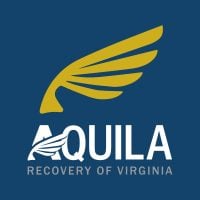
The facility name, logo and brand are the property and registered trademarks of George Mason University - Student Support and Advocacy Center, and are being used for identification and informational purposes only. Use of these names, logos and brands shall not imply endorsement. RehabNow.org is not affiliated with or sponsored by George Mason University - Student Support and Advocacy Center.

